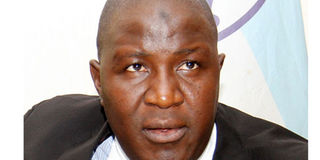Chief Justice’s silence on age limit debacle is disappointing

Justice Forum party president Asuman Basalirwa was one of the Opposition leaders who campaigned against the lifting of the age limit from the Constitution. PHOTO BY ABUBAKER LUBOWA/FILE
Age limit. Justice Forum party president Asuman Basalirwa was one of the Opposition leaders who campaigned against the lifting of the age limit from the Constitution. One of the arguments proponents of the constitution amendment Bill (now Act) raised was that the Supreme Court had in the 2016 Amama Mbabazi election petition ordered government to carry out reforms and it was on the basis of that directive that they moved the Bill. Ivan Okuda talks to Mr Basalirwa who was one of Mr Mbabazi’s lawyers in that case.
As a political leader, what do you make of the developments in the august House leading to the eventual amendment of the Constitution?
The developments are very unfortunate and saddening because Parliament went through a process which in reality is contrary to the wishes and aspirations of the people; they were asked to consult Ugandans who made their opinions clear to them but when they came back to Parliament, they gave personal views and neglected the views of the voters. The purpose of the consultation was defeated.
Secondly, the entire process of amending the Constitution was marred by controversy, confrontation and illegality such as the suspension of the six MPs by the Speaker which, with the greatest respect, was illegal.
Then there was the retrospective extension of the term of Parliament to seven years. As a political party, working with other stakeholders, we shall ensure these things are challenged and struck out by court.
The catch phrase by NRM MPs and sections of the Executive was that the Supreme Court in the Amama Mbabazi election petition directed government, to, in two years, carry out reforms and whatever was done was, according to them, in pursuance of that decision. You were counsel in that case. Can you help separate the truth from fiction?
First of all, the Supreme Court didn’t make a ruling, it made a raft of recommendations, and those recommendations have been made since the 2001, 2006 Kizza Besigye versus Electoral Commission and Yoweri Kaguta Museveni election petitions and in 2016 the court repeated them, only that it gave government an ultimatum of two years within which the Attorney General must report back to court.
The recommendations do not, however, constitute the judgment so government can implement or ignore them as it has done anyway.
That however, is beside the point. When the court made those recommendations, it advised government to report back in two years, so clearly there was still time. Why then was Parliament in a hurry, bulldozing everyone and stampeding the process to the extent of passing the Bill close to midnight?
Thirdly, when you look at the recommendations the Supreme Court made, none of them had a bearing on Article 102(b) of the Constitution.
The complaints we brought to the court’s attention hinged on electoral reforms such as how the Electoral Commission is constituted, the law governing the use of BVVK machines because as you may recall, we wanted to access the data in those machines and the then Electoral Commission chairman, Dr Badru Kiggundu, told court the machines don’t store that data so our question was, why use them if they don’t store data?
The other issue was access to the public media facilities and what the consequences are if unfair access is accorded to candidates, how State resources are used during campaigns and the transmission of results.
What does this mean for the Supreme Court which made the core recommendations?
Their silence in this matter is equally unfortunate because everyone is justifying what they are doing using the Supreme Court. The Chief Justice or spokesperson of the Judiciary should have come out to clarify what the Supreme Court intended to achieve and it is not too late for them to do this.
Secondly, the idea of Parliament moving fast to address the recommendations of the Supreme Court is commendable but you see the Supreme Court’s audience was specific to government which still hasn’t met the obligations. The Attorney General was particularly ordered to report to court, an MP takes the initiative but government still hasn’t made efforts to comprehensively address the recommendations and meet its obligations so we are back to the cycle of government of ignoring Supreme Court decisions.
Wouldn’t this silence by the Judiciary which you passionately allude to mean the impending petition challenging the Constitution Amendment Act is dead on arrival?
The silence by the Supreme Court has no bearing on the petition we intend to file in the Constitutional Court once the Act has been published in the gazette. I don’t want to imagine that petition is dead on arrival as you speculate, as someone involved in it, I am confident that it is merited and has strong grounds.
We are not only challenging the retrospective extension of the term of Parliament, something even a first year student of law knows is not legally sustainable, we are not only challenging the removal of the age limit but also the entire process from start to end which was marred by flagrant flouting of rules of procedure and other illegalities.
Are you confident that the court has the independence and judicial boldness to upstage a status quo that goes to the heart of the political survival of a seemingly overbearing President?
The reason we are going to court is because we still hold the Judiciary in high esteem, we haven’t reached a level of losing total hope in it. There are two or three people who have exhibited partiality from the start and luckily one of them is out now but that doesn’t take away our confidence in the Judiciary.




